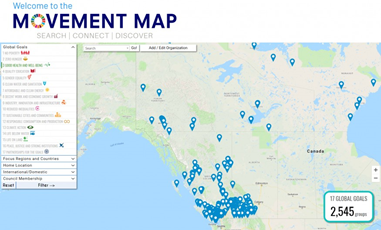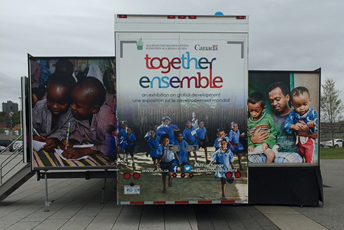Important: The GCConnex decommission will not affect GCCollab or GCWiki. Thank you and happy collaborating!
Difference between revisions of "2.3 – Going further"
| Line 122: | Line 122: | ||
* [https://www.upadi-agri.org/ Laval University Finance Department] | * [https://www.upadi-agri.org/ Laval University Finance Department] | ||
* [https://www.upadi-agri.org/ SeedChange (formerly USC Canada)] | * [https://www.upadi-agri.org/ SeedChange (formerly USC Canada)] | ||
| + | |||
| + | ==== Social empowerment ==== | ||
| + | |||
| + | * [https://www.akfc.ca/ Aga Khan Foundation Canada] | ||
| + | * [https://communityfoundations.ca/ Community Foundations of Canada] | ||
| + | * [https://plancanada.ca/ Plan International Canada] | ||
| + | * [https://pwrdf.org/ Primates World Relief and Development] | ||
| + | * [https://queenelizabethscholars.ca/ Queen Elizabeth Scholars] | ||
| + | * [https://www.rotary.org/en Rotary] | ||
| + | * [[Tula Foundation]] | ||
Revision as of 13:00, 29 April 2021
Public Engagement Framework (INFO TO COME)
Case study: Examples of innovative PE initiatives
Example 1: British Columbia Council for International Cooperation (BCCIC) - Movement Map
Example 2ː Aga Khan Foundation Canada - Together: An exhibition on global development.
Understanding how Canada engages with civil society
To ensure that Canada efficiently engages the most Canadians possible as global citizens, Global Affairs Canada collaborates with a variety of partner organizations including civil society organizations (CSOs), universities and associations. Global Affairs Canada recently updated its policy on Civil Society Partnerships for International Assistance, which sets out the department’s approach to enhancing effective cooperation with Canadian, international and local CSOs to maximize the impact and results of Canada’s international assistance and foster a strong and vibrant civil society sector.
Objective 8 of Global Affairs Canada’s policy on Civil Society Partnerships for International Assistance
Engaging Canadians as global citizens in international assistance
Canadian CSOs are globally recognized leaders for their expertise in the areas of peace and security, humanitarian action and sustainable, transformative development. They also have a unique and positive approach to supporting local CSOs to build capacity and take ownership of their programming and results. Their strong relationships with local CSOs, including women’s organizations, strengthen Canada’s engagement at the community level and enhance Canada’s networks abroad. Global Affairs Canada is committed to engaging with diverse Canadian CSO partners to build their capacity and maximize the global impact of Canada’s CSO community. Establishing new Canadian CSO partnerships can increase the effectiveness of Global Affairs Canada’s and the CSOs’ own international assistance efforts, and ensure that Canada’s investments yield lasting results.
Canadian CSOs play a key role in expressing Canadian values and telling Canada’s feminist international assistance story, which can foster global citizenship, particularly among youth, and help inspire Canadians to engage in transformative action to reduce poverty and overcome gender inequality. CSOs engage Canadians in a broader and deeper understanding of international issues, including promoting global citizenship and mobilizing citizens to participate actively in Canada’s international assistance efforts.
Action area 8.1
Global Affairs Canada will, where appropriate, encourage Canadian CSOs to create pan-Canadian partnerships with global reach that can tackle major development challenges, such as gender equality and the empowerment of women and girls
Action area 8.2
Global Affairs Canada will amplify the work of CSO partners to strategically engage Canadians in international assistance through innovative digital technologies and an enhanced online presence
Action area 8.3
Global Affairs Canada will invest strategically in Canadian CSO public engagement activities, in Canada and abroad, that enhance visibility and raise awareness of Canada’s international assistance results, as well as build citizen engagement and contributions to international assistance efforts
Importance of collaboration
One of the key ingredients to successful public engagement initiatives is collaboration with a wide range of civil society organizations.
Such collaboration can help organizations to be more efficient and maximize their results. For example:
- Collaboration between CSOs can add value, encourage a meaningful exchange of knowledge and resources, and increase the impact and reach of new/diverse audiences.
- Coordinating efforts and leveraging resources toward the same event, campaign or other activity can help to maximize effect. Collaborative development of PE activities often leads to better-developed activities.
- CSOs can leverage partnerships to achieve their objectives. By leveraging the messaging power of partners, CSOs can achieve three important objectives.
- They can access audiences that may otherwise be out of reach.
- Partners may be seen as being more “credible,” facilitating the uptake of messages.
- Smart partnerships can be a way of doing more with less, particularly when communication offices face resource constraints.
- Strategic partnerships can be essential for development public engagement strategies to achieve their goals.
Get in touch with your provincial or regional council
The Inter-Council Network is a coalition of the eight provincial and regional councils for international cooperation. These independent, member-based councils are committed to global social justice and social change, and represent more than 350 diverse civil society organizations from across Canada.
These organizations will be able to support and guide you with tools, resources and information on how to approach different topics related to public engagement and education to public engagement.
- Atlantic Council for International Cooperation
- Quebec Association of International Cooperation Organizations
- Ontario Council for International Cooperation
- Manitoba Council for International Cooperation
- Saskatchewan Council for International Cooperation
- Alberta Council for Global Cooperation
- Northern Council for Global Cooperation
- British Columbia Council for International Cooperation
Connect with other organizations on public engagement matters
International internships
- Bow Valley College
- Canadian Crossroads International
- Canadian Executive Service Organization
- Carrefour de solidarité international Sherbrooke
- Centre de solidarité internationale du Saguenay-Lac-St-Jean
- Centre d’étude et de coopération internationale
- Comité de Solidarité Trois-Rivières
- Cuso International
- Douglas College
- Éducation internationale, cooperative for educational development and exchange services
- Engineers without Borders
- Interagency Coalition on AIDS and Development
- International Bureau for Children’s Rights
- Jeunesse Canada Monde (Canada World Youth)
- La Société Mer et Monde
- Lawyers without Borders Canada
- Memorial University
- Oxfam-Quebec
- Simon Fraser University
- SUCO
- Terre sans-frontiers
- United Nations Association in Canada
- Uniterra
- University of Toronto
- University of Victoria, Centre for Asia-Pacific Initiatives
- Veterinarians without Borders
- Victoria International Development Education Association
- WUSC
- Youth Challenge International
Environment and climate action
- Canadian Feed the Children
- Canadian Foodgrains Bank
- Global Communities
- Dalhousie University, International Research and Development
- Development and Peace
- École Polytechnique de Montréal
- Farm Radio International
- Hope International Development Agency (HIDA)
- IDRC, Canadian International Food Security Research Fund
- International Institute for Sustainable Development
- McGill University
- Rainbow of Hope for Children Society
- Resource Efficient Agricultural Production
- SHARE Agricultural Foundation
- Union des producteurs agricoles Développement international
- Laval University Finance Department
- SeedChange (formerly USC Canada)


